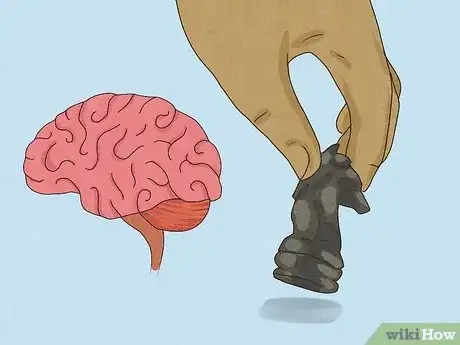This article was co-authored by wikiHow staff writer, Sophia Latorre. Sophia Latorre is a Content Manager on the wikiHow team. Before joining wikiHow, Sophia worked as a technical editor and was published in six International Energy Agency (IEA) Wind Annual Reports. Now, she writes, edits, and reviews articles for the wikiHow Content Team, working to make the content as helpful as possible for readers worldwide. Sophia holds a BA in English from Colorado State University.
There are 8 references cited in this article, which can be found at the bottom of the page.
This article has been viewed 24,957 times.
Learn more...
INTP, one of the 16 types in the Myers-Briggs personality classification system, stands for “introversion, intuition, thinking, and perceiving.” INTPs are known for their insatiable curiosity, endless ideas, and exceptional minds. Yet, as one of the most uncommon types, if you’re an INTP, you might struggle to find your place in the world. Thankfully, we’ve got tons of tips to help you live a fulfilling life.
Steps
Personality Type Basics
-
1Get your MBTI results from a reputable online test. Numerous online tests have been designed to determine your personality type. Search “MBTI test” (Myers-Briggs Type Indicator) and many options will appear. Look for one from a reputable site that relies on strong sources and cites the Myers-Briggs research. If you’re willing to pay a fee, take the official Myers-Briggs Type Indicator.
- Know that the results of the official MBTI test are not guaranteed to be correct. The Myers & Briggs Foundations gives a consistency rate of 63%. [1]
-
2See if your preferences align with the INTP preferences. INTPs prefer introversion, intuition, thinking, and perceiving to extroversion, sensing, feeling, and judging.[2] Does this align with your own preferences?
- If you’re introverted, you might prefer alone time to large gatherings.
- If you’re intuitive, you likely look at the big picture and see possibilities.
- As a thinker, you use logic and facts to make decisions, instead of emotions.
- As a perceiver, you’re adaptable and open to possibilities.
Advertisement -
3Compare an INTP’s qualities with your own. People who are classified as INTPs are often logical, objective, rational, quiet, reflective, strategic, curious, flexible, informal, and future-oriented.[3] Does that sound like you?
-
4Note that INTPs lead with Introverted Thinking (Ti). This is the first element of the “function stack” for your personality. Leading with Ti makes you very logical and you might learn for the sake of learning. You likely care about accuracy, minute details, and how everything fits together. You can also be very blunt, pointing out the truth even when it might be hurtful.[4]
- Because Ti is a subjective function, you might have trouble explaining your thought process and ideas to others.
- There are 4 functions in the function stack, and each describes the core values and characteristics of your personality type.[5]
-
5Understand that your auxiliary function, Ne, is Extraverted Intuition. This function makes you highly creative. If you’re an INTP, you’re likely bursting with ideas and have a tendency to look for patterns and possibilities. You’re open minded, but can have a hard time making decisions.[6]
- As an Ne, you might make connections between seemingly unrelated ideas.
-
6Recognize that your tertiary function is Introverted Sensing (Si). As someone with Si, you likely enjoy routines and things that are familiar. You might also be a minimalist and someone that prefers to save, rather than spend, money.[7]
- For instance, you may enjoy looking at old photos, rereading a favorite book, or listening to a song that holds a special meaning.
-
7Know that your inferior function is extraverted feeling (Fe). The Fe function might make you feel as though your emotions can have a mind of their own. Social encounters can also be awkward or uncomfortable for you. With inferior Fe, you likely have a tendency to make peace with others and avoid confrontation.[8]
- Since Fe is an inferior function, you may have a hard time understanding and expressing your emotions.
-
8Debunk MBTI stereotypes. Allowing stereotypes to get into the way can bias your typing process. You may have heard that INTPs are unemotional robots, but that’s not true. As an INTP, you might even be highly sensitive and experience intense emotions.
- You might also think that INTPs are scientists or mathematicians that wear glasses. This isn’t always the case! As an INTP, you could enjoy art, philosophy, and many other pursuits not related to math or science.
- Also, remember that no preference or type is better than another. All people bring value to the world.[9]
Self-Care and Emotional Development
-
1Take care of your body. If you’re busy with an idea or project, you might forget to eat or take breaks.[10] Set reminders on your phone or alarm so you can make time to check in with your body. See to it that all of your needs are met on a daily basis so you can be at your best! Get enough sleep, eat well, and take care of your other bodily needs.
- Most adults need around 7-9 hours of sleep. Teens need roughly 8-10 hours.[11]
- Listen to your body for cues! Check in with yourself so you can recognize if you’re hungry, thirsty, tired, or have another need.
- Make it a point to maintain good hygiene, too.
-
2Work on understanding your emotions. As an INTP, you may find yourself ignoring or not understanding your emotions. Your emotions might even seem other-worldly and mystifying.[12] When you’re feeling a certain way, pause and take stock. Is your emotion based in fear, anger, surprise, disgust, sadness, or joy? With practice, you can learn to recognize and manage your feelings.
- Avoid ignoring your emotions because they seem illogical. Take the time to feel them and sort them out—you’ll be better off in the long run!
- Talk to others about how you’re feeling. A trusted friend or counselor can help you work through your emotions.
-
3Develop your self-confidence. Your personality type makes you both analytical and critical. If you spend too much time criticizing yourself, you could damage your self-esteem. Take time to remind yourself of your positive qualities.
- Stick post-it notes with encouragements around your home or on your desk to remind yourself how amazing you are!
-
4Keep things organized and try not to procrastinate. As an INTP, you might struggle to complete tasks that don’t interest you. Tasks like tidying up may also fall by the wayside.[13] Be aware of your tendencies and make time to clean and organize your living and work spaces. Make it a point to tackle projects that you’ve been putting off.
- Using a planner or making to-do lists can help you stay on track.
-
5Embrace your strengths. Because of your INTP mind, you might feel different than others. That’s okay! Instead of trying to fit the mold, accept your uniqueness and focus on your positive qualities.
- Some strengths you might possess include: being highly imaginative, intellectual, honest, enthusiastic, and open-minded.
Communication and Socialization
-
1Make time to socialize. Because social functions can be awkward, you might find yourself avoiding them. If you’re shy, you may avoid talking to people you don’t know.[14] However, we all need social interaction, so make it a point to catch up with your friends and family. Accept invitations to gatherings and try to connect with those around you.
- If you want to find ways to socialize, consider dating, joining special interest groups, bonding with people you already know, and even talking to random people.
- If you can't find people sharing your interests in-person, you can try posting on an online forum dedicated to your interests.
-
2Be aware of other people’s feelings. You probably have a tendency to be blunt, which might be off-putting to others.[15] In social situations, take special care to be aware of other people’s feelings. Watch their body language and facial expressions, and really listen to what they’re saying.
- You can state your opinions and disagree with others respectfully without putting other people down.
-
3Hone your conflict resolution skills. As an INTP, you likely have a tendency to be a peace-maker. Or, you may be prone to arguing in order to prove your point.[16] Aim for a balance here—don’t avoid confrontations altogether, but don’t start them unnecessarily. Work on speaking up in a polite, respectful manner when something bothers you. Use “I” statements to tell others how you feel while avoiding blaming them.
- Healthy debates and constructive criticism are okay, but remember that a shouting match or blog post bashing someone else is not.
- Try stepping back and thinking about how your words will be perceived and if they're necessary.
References
- ↑ https://www.myersbriggs.org/my-mbti-personality-type/mbti-basics/reliability-and-validity.htm
- ↑ https://www.myersbriggs.org/my-mbti-personality-type/mbti-basics/
- ↑ https://www.bsu.edu/about/administrativeoffices/careercenter/tools-resources/personality-types/intp
- ↑ https://personalityjunkie.com/the-intp/
- ↑ https://personalityjunkie.com/functional-stack-type-dynamics-theory/
- ↑ https://personalityjunkie.com/the-intp/
- ↑ https://personalityjunkie.com/the-intp/
- ↑ https://personalityjunkie.com/the-intp/
- ↑ https://www.myersbriggs.org/my-mbti-personality-type/mbti-basics/
- ↑ https://personalityjunkie.com/the-intp/
- ↑ https://www.cdc.gov/sleep/about_sleep/how_much_sleep.html
- ↑ https://www.truity.com/personality-type/INTP/strengths-weaknesses
- ↑ https://students.usask.ca/documents/secc/INTP.pdf
- ↑ https://students.usask.ca/documents/secc/INTP.pdf
- ↑ https://students.usask.ca/documents/secc/INTP.pdf
- ↑ https://personalityjunkie.com/the-intp/











































































